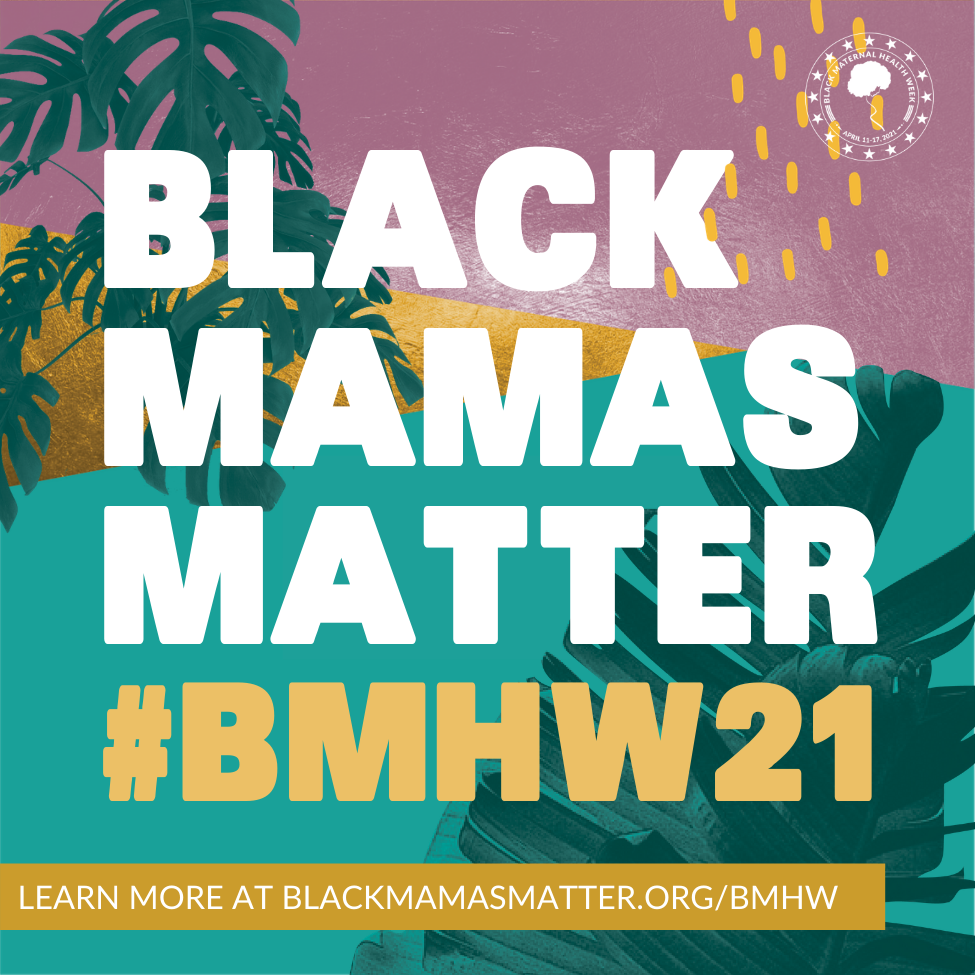|
Just because Black Maternal Health Week is coming to a close, doesn’t mean we stop advocating for black women and babies. Implicit bias, or a subconscious negative attitude toward a certain group, is a major problem affecting Black mothers and their babies. Over the course of the last week we’ve posted some bleak statistics that bear repeating:
-Black women are three to four times more likely than white women to experience a pregnancy-related death. The CDC reports three out of five of those deaths could have been prevented. -Underlying health conditions make pregnancy more risky for black women. High blood pressure and cardiovascular disease are two of the leading causes of death according to the CDC. African-Americans are at an increased risk for these conditions, which have a dangerous effect on pregnancy. -Black women are mistreated by the healthcare system. A report from the Institute of Medicine found that Black Americans receive less quality healthcare than whites for nearly every disease there is, including prenatal care. Data shows that black women often aren't believed when they say they are in pain, and much of that is due to discrimination and bias in the healthcare industry. -Black infant mortality rates keep going up. You read that right: black infant mortality rates keep going UP. Not only are black mothers at risk while giving birth, so are their babies. Black infants in America are twice as likely to die as white infants. According to the CDC, well-educated, middle-class black mothers are more likely to lose their babies than poor white mothers without a high school diploma. -Black women receive less help for postpartum depression. Postpartum depression is debilitating and affects roughly 10-20% of women who give birth. Black mothers are less likely to get the help they need. According to the National Institutes of Health, about 8% of white women receive treatment for their postpartum depression compared to only 4% of black women. If you are a parent of color, here are 5 ways to self advocate, courtesy of @drkiarraking: -See a doctor you trust. -Never be afraid to ask questions. If you are made to feel less than or as if you are bothering the doctor, FIND A NEW ONE. -Bring a family member, friend, or trusted ally like your doula with you to visits. -Never be afraid to get a second opinion. -Listen to your body and trust your instincts. Pregnancy can bring a lot of uncertainty. If you are concerned, SPEAK UP. The New York Times also just published this excellent guide for black mothers and their care providers, "Protecting Your Birth: A Guide for Black Mothers." And if you are an advocate for a parent of color, here are 6 ways to take action now, courtesy of DONA International: Make a donation to The Grand Challenge. This organization funds full scholarships to midwifery school, doula trainings, and childbirth educator trainings to people of color so they can gain the skills they need to work effectively in their communities. If you are a faculty member, trainer or instructor in any of these areas, consider participating in The Grand Challenge by offering a full scholarship, a mentor-ship or being a preceptor to a participant selected by The Grand Scholarship. Donations of services or funds can make a huge difference and make education accessible to folks who need some support. Consider offering a free or reduced fee birth or postpartum package to a family of color so they can personally experience the benefits of having a doula on their team. Bluebird Baby Co is happy to discuss our sliding scale with you. We want ALL parents to feel supported through birth and postpartum. Write a blog post to share on your website or on a local community blog about Black Maternal Health Week and some of the inequities that Black families face during pregnancy, birth or postpartum. Increase your own awareness of the issues facing Black families by reading “Battling over Birth: Black Women and the Maternal Health Care Crisis.” DONA International has reviewed this amazing book and loved how it centered the experiences of Black women and parents. Download the DONA International Legislative Toolkit which was created by DONA International’s Advocacy Committee, and learn how to advocate for change on the local, state and national level that will impact Black families who are pregnant, birthing and parenting. Join DONA International’s Health Disparities and Inequities subcommittee under the direction of Kelli Brien, Subcommittee Chair. Contact the Advocacy Committee to get connected. The Health Disparities and Inequities subcommittee “aims to raise awareness among doulas, clients, healthcare providers, policymakers, and the general public about disparities and inequities in healthcare; educate DONA International doulas in effective ways to reduce health disparities and inequities, as well as improve health outcomes among communities currently and historically experiencing discrimination; and decrease disparities and inequities among population groups and communities within our scope of practice as doulas.” The inequities and racism facing black families every day are unacceptable, but they are not insurmountable. We must take responsibility for educating ourselves, advocating to improve the situation, speaking out, and supporting families of color.
0 Comments
Leave a Reply. |
Serving all birth centers, hospitals, and home births with independent midwives in the Treasure Valley and surrounding areas:
St. Luke's-Boise, Meridian, Nampa, Wood River (mileage fee applies)
St. Alphonsus-Boise and Nampa
Treasure Valley Midwives
New Beginnings
Boise River
Family Tree Midwifery
Copyright 2024 Bluebird Baby Company LLC
Boise, Idaho
St. Luke's-Boise, Meridian, Nampa, Wood River (mileage fee applies)
St. Alphonsus-Boise and Nampa
Treasure Valley Midwives
New Beginnings
Boise River
Family Tree Midwifery
Copyright 2024 Bluebird Baby Company LLC
Boise, Idaho


 RSS Feed
RSS Feed